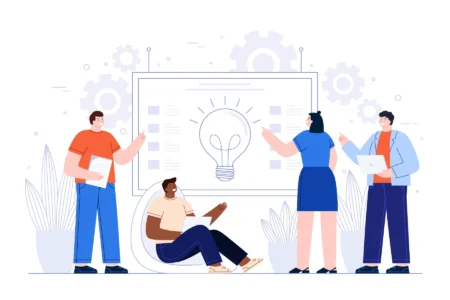Soft Skills au Maroc
Développez vos compétences comportementales pour réussir en entreprise

900+ Entreprises Servies

DHL Global Forwarding
"Apprendre avec Red Rock a été à la fois efficace et FUN ! Maintenant, je dois gérer la demande croissante de mon équipe pour d’autres formations du même type. Merci à l’équipe Red Rock pour votre professionnalisme et votre énergie."

Africa Business School | UM6P
Merci pour votre excellent travail et votre professionnalisme ! Chaque fois que nous faisons appel à vous, nous savons que les résultats dépasseront toujours nos attentes !

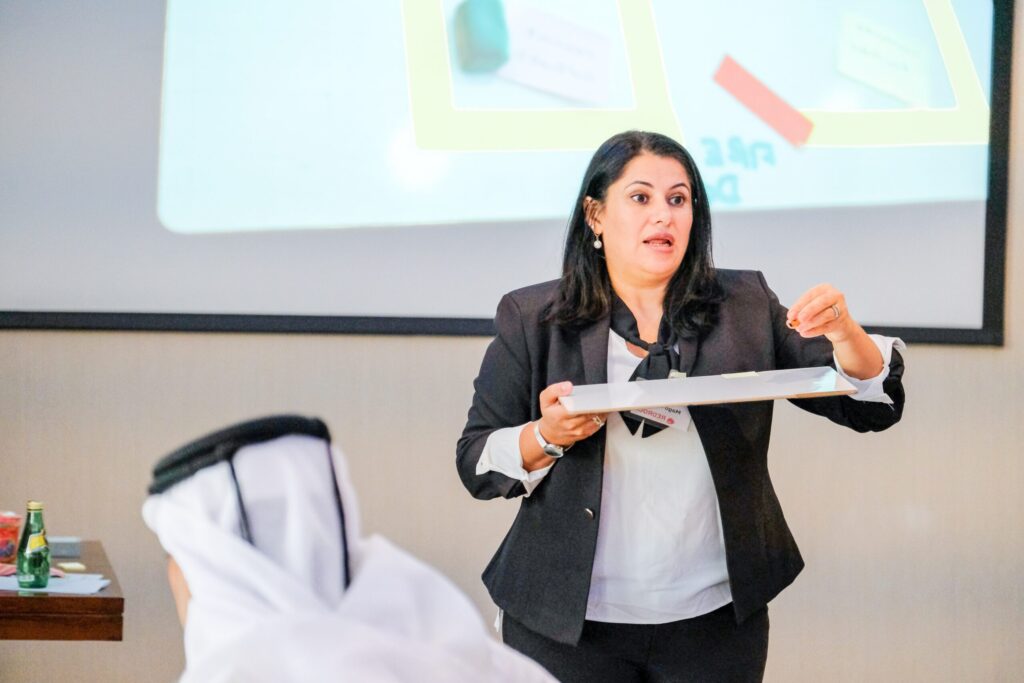

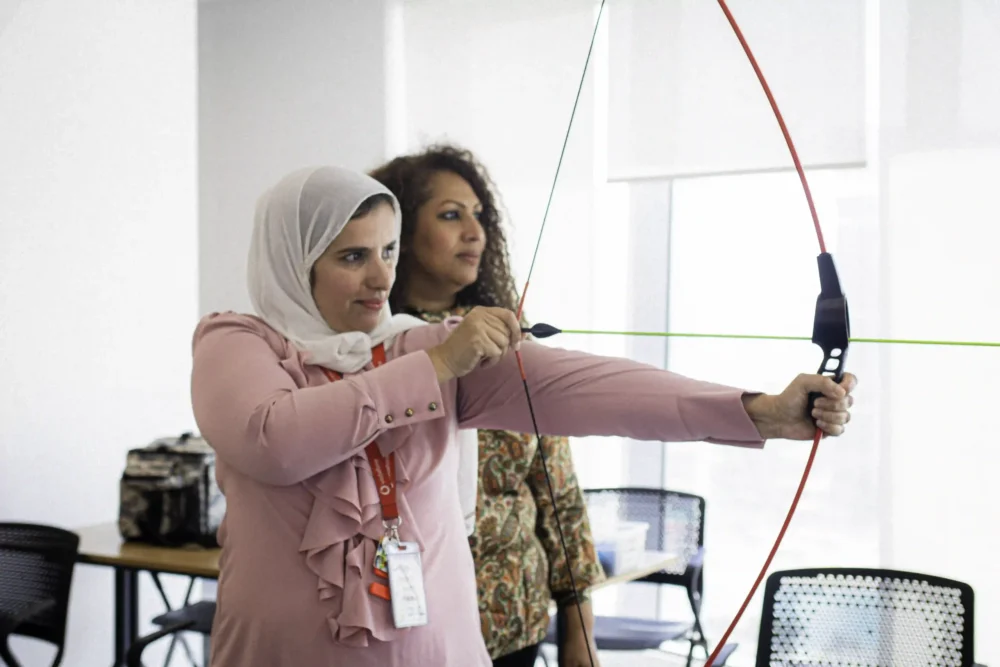
Nos formations en soft skills
Boostez vos compétences avec nos formations Soft Skills au Maroc.
Leadership, gestion des conflits, service client : des programmes conçus pour renforcer vos équipes et développer vos soft skills !
Gestion des Conflits

Développez des compétences pratiques pour désamorcer les tensions et gérer les différends de manière constructive.
Résolution de Conflits

Apprenez à écouter, dialoguer et trouver des solutions durables pour sortir des situations conflictuelles.
Le Courage de Continuer

Renforcez votre résilience personnelle pour faire face aux défis et rebondir face à l’adversité.
Service Client

Améliorez vos compétences en communication et apprenez à gérer les clients avec professionnalisme et empathie.
Fondamentaux du Leadership

Découvrez les bases d’un leadership efficace pour inspirer, motiver et guider une équipe.
Obtenez un devis personnalisé dès aujourd’hui !
Contactez-nous par téléphone ou via le formulaire de contact en ligne.
Nous fixerons une réunion pour discuter de vos besoins spécifiques.
Nous pouvons apporter les modifications nécessaires jusqu’à ce que vous soyez satisfait de la solution proposée.
"*" indicates required fields
L’Importance Croissante des Soft Skills au Maroc
Dans un monde professionnel en pleine transformation, les soft skills, ou compétences douces, sont devenues indispensables pour réussir. Au Maroc, où l’économie connaît une croissance dynamique avec des secteurs comme le tourisme, les technologies, les énergies renouvelables et la manufacture, ces compétences interpersonnelles sont essentielles pour se démarquer. Que vous soyez un directeur des ressources humaines (DRH) cherchant à optimiser vos équipes, un PDG souhaitant renforcer la compétitivité de votre entreprise, un employé aspirant à une progression de carrière, ou un particulier désirant améliorer ses relations, les soft skills sont votre clé pour prospérer.
Les soft skills incluent des aptitudes comme la communication, le leadership, l’adaptabilité et la gestion des conflits, qui favorisent la collaboration et l’innovation. Chez Red Rock International, nous offrons des formations en soft skills au Maroc personnalisées, conçues pour répondre aux besoins spécifiques du marché marocain. Ce guide détaillé explore ce que sont les soft skills, pourquoi elles sont cruciales au Maroc en 2025, et comment nos programmes peuvent transformer votre parcours professionnel ou personnel, avec environ 2 000 mots pour vous fournir une ressource complète.
Qu’est-ce que les Soft Skills et Pourquoi Sont-elles Essentielles au Maroc ?
Les soft skills, ou compétences douces, désignent des qualités non techniques qui améliorent les interactions humaines, la collaboration et la performance au travail. Contrairement aux hard skills (comme la programmation ou la comptabilité), elles sont universelles et incluent des traits tels que la communication, le travail d’équipe, la résolution de problèmes et l’intelligence émotionnelle. Au Maroc, où les entreprises évoluent dans un environnement multilingue et multiculturel — mêlant arabe, français, anglais et amazigh —, ces compétences sont vitales pour surmonter les défis culturels et économiques.
Selon l’Agence Marocaine de Développement des Investissements et des Exportations (AMDIE), 78 % des employeurs marocains priorisent les soft skills lors du recrutement, notamment pour leur rôle dans l’adaptabilité et la collaboration dans des secteurs en croissance comme le tourisme et la technologie. Le Ministère de l’Emploi et de l’Insertion Professionnelle souligne également que les soft skills sont essentielles pour réduire le chômage des jeunes, qui atteint environ 10 % en 2024, en renforçant l’employabilité grâce à des compétences comme la communication et la résilience.
Prenons un exemple concret : un manager d’hôtel à Marrakech, formé en gestion des conflits et en empathie, peut transformer une plainte de client en une expérience positive, boostant la satisfaction et la fidélité. De même, un employé d’une startup à Rabat, maîtrisant l’adaptabilité et la créativité, peut innover pour répondre aux défis numériques, un besoin croissant au Maroc.
Les Soft Skills Clés pour Réussir au Maroc
Voici un tableau détaillé des soft skills les plus recherchées au Maroc, basé sur nos observations chez Red Rock International et les tendances actuelles du marché. Chaque compétence est décrite avec une pertinence locale pour les professionnels, managers et particuliers :
Soft Skill | Description |
Communication | Transmettre des idées avec clarté et écouter activement en arabe, français ou anglais, essentiel pour les environnements multilingues marocains. |
Travail d’équipe | Collaborer efficacement avec des collègues diversifiés, clé dans la culture marocaine riche et variée. |
Adaptabilité | S’adapter aux changements rapides, comme les technologies ou les évolutions du marché, vital pour l’économie marocaine en croissance. |
Leadership | Inspirer et guider une équipe avec vision et confiance, crucial pour les leaders émergents au Maroc. |
Résolution de problèmes | Aborder des défis complexes de manière créative, une compétence clé pour les secteurs innovants comme les énergies renouvelables. |
Gestion des conflits | Résoudre les tensions de manière constructive, indispensable dans des équipes diversifiées à Casablanca ou Tanger. |
Empathie | Comprendre les perspectives d’autrui pour renforcer la confiance, ancrée dans la culture relationnelle marocaine. |
Gestion du temps | Prioriser les tâches pour maximiser la productivité, essentiel dans les environnements dynamiques de Rabat. |
Créativité | Innover pour proposer des solutions uniques, une demande croissante dans les secteurs tech et touristiques d’Agadir. |
Intelligence émotionnelle | Gérer ses émotions et celles des autres pour des interactions positives, clé pour le leadership au Maroc. |
Ces compétences sont enseignées à travers nos formations interactives, adaptées aux réalités marocaines, pour garantir une application immédiate.
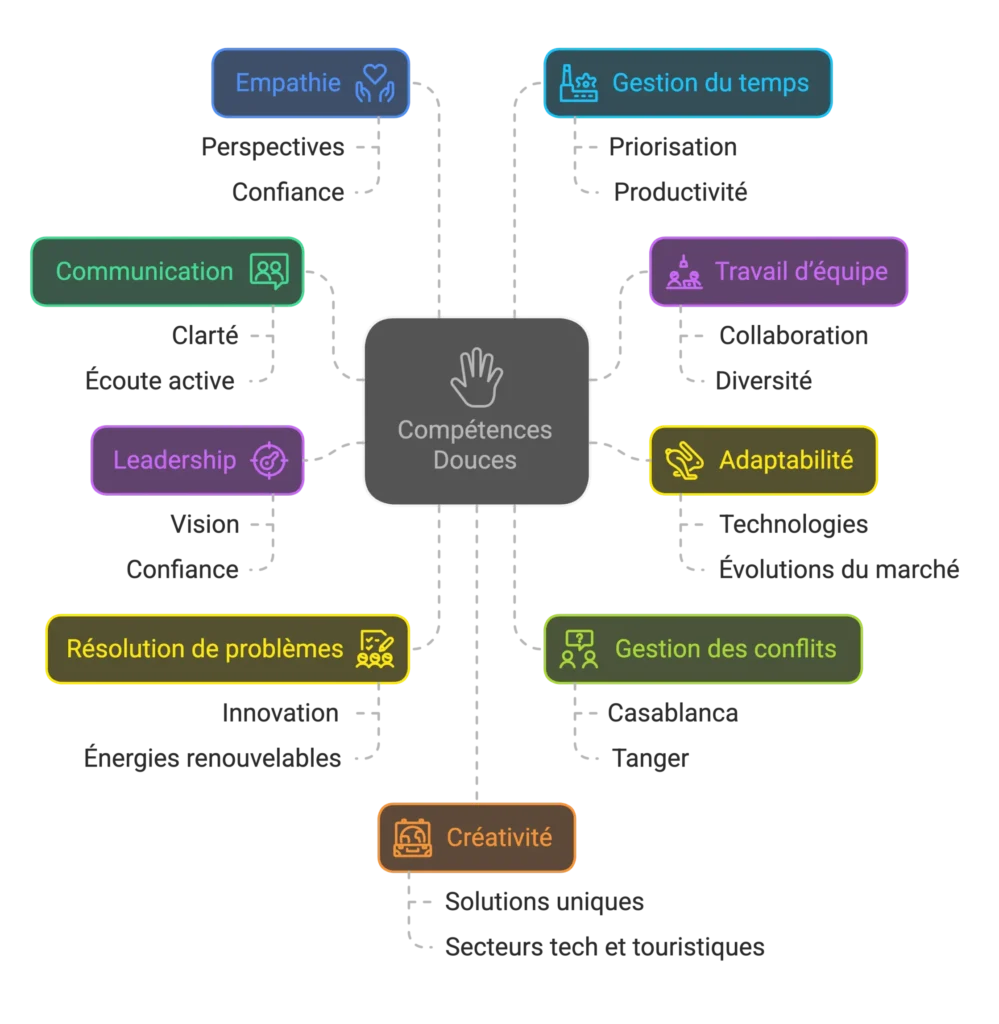
Pourquoi les Soft Skills Sont Cruciales pour le Marché Marocain
Le Maroc, positionné comme un pont entre l’Afrique, l’Europe et le Moyen-Orient, dépend des soft skills pour maintenir sa compétitivité. Voici pourquoi elles sont essentielles :
Croissance Économique et Intégration Globale
L’économie marocaine est projetée à une croissance de 3,5 % en 2025, grâce à des investissements dans les infrastructures, les énergies renouvelables et le tourisme. L’AMDIE souligne que les entreprises étrangères investissant au Maroc valorisent les compétences comme la communication interculturelle et la résolution de problèmes, des atouts que Red Rock International cultive dans ses formations.
Main-d’œuvre Multiculturelle et Jeune
Avec une population jeune et diversifiée, influencée par des racines amazighes, arabes et européennes, le Maroc abrite une main-d’œuvre riche mais complexe. Les soft skills comme l’empathie et le travail d’équipe favorisent la collaboration, que ce soit dans un centre d’appels à Casablanca ou un hôtel à Marrakech.
Réduction du Chômage des Jeunes
Le Ministère de l’Emploi promeut les soft skills pour autonomiser les jeunes, réduisant le chômage grâce à des compétences comme la négociation et la résilience. Ces atouts aident les jeunes Marocains à se démarquer dans des secteurs compétitifs comme la tech et les services.
Exemple Pratique : Tourisme à Agadir
Un guide touristique à Agadir, formé en communication et en service client, peut transformer une expérience moyenne en une recommandation enthousiaste, renforçant la réputation touristique marocaine. Ce scénario montre comment les soft skills stimulent les industries de services au Maroc.
Les Bénéfices des Soft Skills pour Différents Profils
Nos formations offrent des avantages concrets pour chaque public au Maroc :

Pour les DRH : Renforcer Vos Équipes
- Amélioration de la Communication : Réduisez les malentendus dans des équipes multilingues.
- Gestion Efficace des Conflits : Résolvez les tensions avant qu’elles ne nuisent à la productivité.
- Rétention des Talents : Créez un environnement positif pour fidéliser vos employés.
Pour les PDG : Diriger avec Vision
- Leadership Stratégique : Inspirez vos équipes pour atteindre des objectifs ambitieux.
- Adaptabilité Culturelle : Naviguez dans le riche paysage d’affaires marocain avec aisance.
- Prises de Décision Éclairées : Utilisez la pensée critique pour des choix stratégiques.
Pour les Employés : Avancer dans Votre Carrière
- Progression Professionnelle : Démarquez-vous avec des compétences prisées comme le leadership et la créativité.
- Gestion du Stress : Affrontez les pressions avec résilience et gestion du temps.
- Réseautage : Bâtissez des relations solides grâce à l’empathie et à la communication.
Pour les Particuliers : Prospérer Personnellement
- Relations Meilleures : Renforcez vos liens avec l’intelligence émotionnelle.
- Confiance Renforcée : Exprimez-vous avec assurance dans toutes les situations.
- Compétences de Vie : Adaptez-vous aux défis personnels, des changements de carrière aux dynamiques familiales.
Red Rock International : Votre Partenaire pour les Soft Skills
Chez Red Rock International, nous combinons une expertise mondiale avec une compréhension locale profonde. Voici ce qui fait notre différence :
- Formations Sur Mesure : Programmes adaptés à votre secteur, rôle et besoins spécifiques au Maroc.
- Flexibilité : Sessions en présentiel à Casablanca, Rabat, Marrakech et Agadir, ou en ligne et hybrides.
- Apprentissage Pratique : Ateliers interactifs avec des scénarios réels, comme gérer une équipe dans une startup marocaine ou résoudre un problème client dans un hôtel.
- Impact Prouvé : Avec plus de 350 000 personnes formées à travers le monde, nos méthodes garantissent des résultats durables.
Nos programmes ciblent des défis locaux, comme favoriser le travail d’équipe dans des environnements multilingues ou développer des leaders dans une économie en évolution.
Comment Développer Vos Soft Skills : Exemples et Stratégies Pratiques
Exemple 1 : Communication dans le Secteur Tech de Casablanca
Un développeur à Casablanca, formé en communication, peut présenter un projet en anglais à un client international, expliquer des concepts techniques en arabe à son équipe, et négocier des délais en français. Nos formations enseignent ces compétences multilingues, garantissant clarté et efficacité.
Exemple 2 : Leadership dans une Startup de Rabat
Un entrepreneur à Rabat utilise les compétences de leadership apprises dans nos ateliers pour motiver son équipe, sécuriser des financements et ajuster des stratégies — des atouts essentiels pour le paysage entrepreneurial marocain.
Stratégies pour Progresser
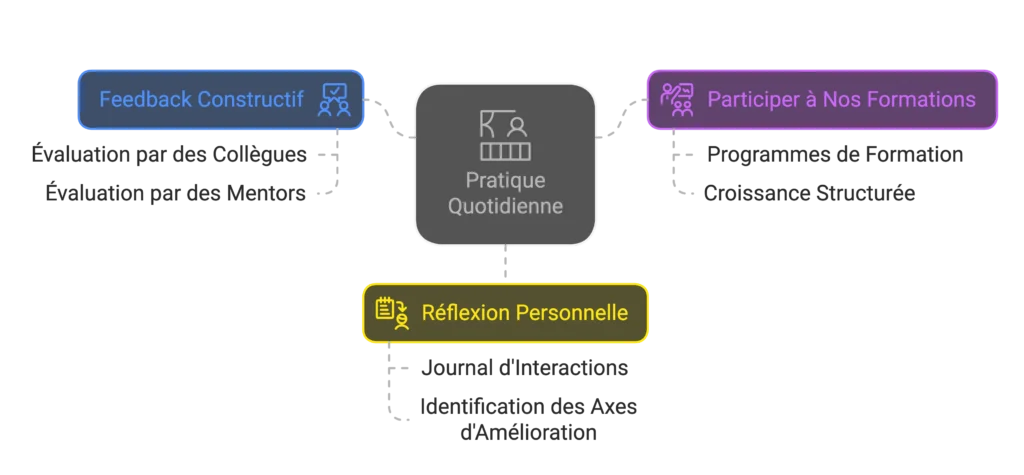
- Pratique Quotidienne : Simulez des situations comme négocier avec un client ou donner un feedback.
- Feedback Constructif : Demandez à des collègues ou mentors d’évaluer vos compétences en communication ou travail d’équipe.
- Participer à Nos Formations : Inscrivez-vous à nos programmes pour une croissance structurée.
- Réflexion Personnelle : Tenez un journal sur vos interactions pour identifier des axes d’amélioration.
L’Avenir des Soft Skills au Maroc
En 2025, les soft skills resteront au cœur de la transformation économique marocaine. L’essor du télétravail, de l’intelligence artificielle et des partenariats mondiaux accentue la demande pour l’adaptabilité, la créativité et l’intelligence émotionnelle. Selon l’AMDIE, 65 % des entreprises marocaines prévoient d’intensifier leurs investissements en formations en soft skills d’ici 2026. Investir maintenant vous positionne pour un succès durable, que vous soyez une entreprise ou un individu.
Lancez-Vous avec Red Rock International
Les soft skills au Maroc sont votre avantage compétitif pour 2025. Que vous soyez DRH, PDG, employé ou particulier, Red Rock International est votre partenaire pour maîtriser ces compétences vitales. Nos formations, centrées sur le contexte marocain, vous permettent de développer communication, leadership et bien plus encore.
Prêt à transformer vos compétences ? Contactez-nous dès aujourd’hui pour une consultation gratuite et commencez votre parcours vers le succès en 2025 et au-delà.


MENTALITÉS ET COMPÉTENCES
Notre approche utilise des expériences fortes pour influencer les attitudes sous-jacentes - fournissant un terrain fertile pour développer de nouvelles compétences posant les fondations sur lesquelles de nouvelles compétences peuvent être construites.

Objectif pratique
Dans chaque domaine du leadership, il existe des comportements critiques qui ont un effet majeur sur les performances. Notre processus permet aux dirigeants d'adopter systématiquement ces changements afin d'obtenir de meilleurs résultats.

Apprentissage engageant
Nos sessions sont généralement basées à 70-80% sur des exercices. Attendez-vous à des expériences longues et immersives qui permettent de mettre en pratique des compétences proches de la réalité et d'influer sur les hypothèses sous-jacentes.
Prestataire reconnu par l'ILM
Red Rock International travaille avec ILM, un fournisseur de qualifications en leadership, en gestion et en coaching internationalement reconnues, qui forment chaque année plus de 70 000 dirigeants.
Depuis 2013, nous proposons nos propres cours reconnus par l’ILM dans des domaines clés du leadership et du développement personnel, notamment les principes fondamentaux du leadership, l’évaluation des performances et la gestion des conflits.




